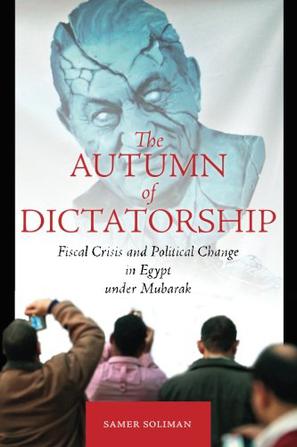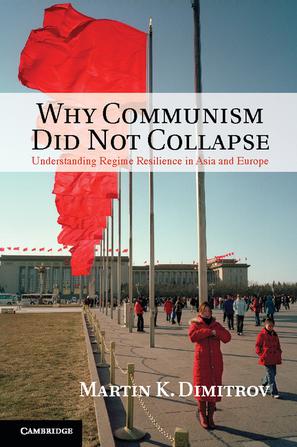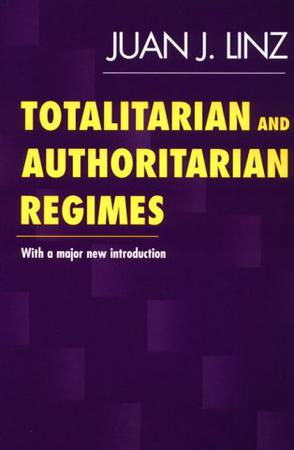-

The Autumn of Dictatorship
The Egyptian protests in early 2011 took many by surprise. In the days immediately following, commentators wondered openly over the changing situation across the Middle East. But protest is nothing new to Egypt, and labor activism and political activism, most notably the Kifaya (Enough) movement, have increased dramatically over recent years. In hindsight, it is the durability of the Mubarak regime, not its sudden loss of legitimacy that should be more surprising. Though many have turned to social media for explanation of the events, in this book, Samer Soliman follows the age-old adage—follow the money. Over the last thirty years, the Egyptian state has increasingly given its citizens less money and fewer social benefits while simultaneously demanding more taxes and resources. This has lead to a weakened state—deteriorating public services, low levels of law enforcement, poor opportunities for employment and economic development—while simultaneously inflated the security machine that sustains the authoritarian regime. Studying the regime from the point of view of its deeds rather than its discourse, this book tackles the relationship between fiscal crisis and political change in Egypt. Ultimately, the Egyptian case is not one of the success of a regime, but the failure of a state. The regime lasted for 30 years because it was able to sustain and reproduce itself, but left an increasingly weakened state, unable to facilitate capitalist development in the country. The resulting financial crisis profoundly changed the socio-economic landscape of the country, and now is paving the way for political change and the emergence of new social forces. -

The New Authoritarianism in Latin America
While one of the most important attempts to explain the rise of authoritarian regimes and their relationship to problems of economic development has been the "bureaucratic-authoritarian model," there has been growing dissatisfaction with various elements of this model. In light of this dissatisfaction, a group of leading economists, political scientists, and sociologists was brought together to assess the adequacy; of the model and suggest directions for its reformulation. This volume is the product of their discussions over a period of three years and represents an important advance in the critique and refinement of ideas about political development. Part One provides an overview of the issues of social science analysis raised by the recent emergence of authoritarianism in Latin America and contains chapters by David Collier and Fernando Henrique Cardoso. The chapters in Part Two address the problem of explaining the rise of bureaucratic authoritarianism and are written by Albert Hirschman, Jose Serra, Robert Kaufman, and Julio Coder. In Part Three Guillermo O'Donnell, James Kurth, and David Collier discuss the likely future patterns of change in bureaucratic authoritarianism, opportunities for extending the analysis to Europe, and priorities for future research. The book includes a glossary and an extensive bibliography. -

Why Communism Did Not Collapse
This volume brings together a distinguished group of scholars working to address the puzzling durability of communist autocracies in Eastern Europe and Asia, which are the longest-lasting type of nondemocratic regime to emerge after World War I. The volume conceptualizes the communist universe as consisting of the ten regimes in Eastern Europe and Mongolia that eventually collapsed in 1989–91, and the five regimes that survived the fall of the Berlin Wall: China, Vietnam, Laos, North Korea, and Cuba. Taken together, the essays offer a theoretical argument that emphasizes the importance of institutional adaptations as a foundation of communist resilience. In particular, the contributors focus on four adaptations: of the economy, of ideology, of the mechanisms for inclusion of potential rivals, and of the institutions of vertical and horizontal accountability. The volume argues that when regimes are no longer able to implement adaptive change, contingent leadership choices and contagion dynamics make collapse more likely. By conducting systematic paired comparisons of the European and Asian cases and by developing arguments that encompass both collapse and resilience, the volume offers a new methodological approach for studying communist autocracies. Offers a new theoretical explanation of the resilience of communist autocracies that emphasizes the structural conditions under which these regimes are able to implement adaptive change Offers a new methodological approach for studying communist autocracies by conducting paired comparisons between the ten regimes that eventually collapsed in 1989�91 and the five regimes that survived past 1989: China, Vietnam, Laos, North Korea, and Cuba Makes a major empirical contribution to our knowledge of how communist autocracies function by: 1) adopting a global perspective onto the phenomenon of global communism; 2) analyzing unfamiliar adaptations, such as the development of institutions of accountability; and 3) using new evidence to challenge existing interpretations of communist durability (especially for countries like China, Vietnam, and North Korea) and of the eventual collapse of communist regimes in Eastern Europe and in Mongolia -

Democracy and Authoritarianism in the Postcommunist World
This volume brings together a distinguished group of scholars working on Eastern Europe and the former Soviet Union to examine in depth three waves of democratic change that took place in eleven different former Communist nations. Its essays draw important conclusions about the rise, development, and breakdown of both democracy and dictatorship in each country and together provide a rich comparative perspective on the post-Communist world. The first democratic wave to sweep this region encompasses the rapid rise of democratic regimes from 1989 to 1992 from the ashes of Communism and Communist states. The second wave arose with accession to the European Union (from 2004 to 2007) and the third, with the electoral defeat of dictators (1996 to 2005) in Croatia, Serbia, Georgia, and Ukraine. Although these three waves took place in different countries and involved different strategies, they nonetheless shared several overarching commonalities. International factors played a role in all three waves, as did citizens demanding political change. Further, each wave revealed not just victorious democrats but also highly resourceful authoritarians. The authors of each chapter in this volume examine both internal and external dimensions of both democratic success and failure. 1 Contains a unique group of country cases, with each chapter presenting new empirical data and analysis 2 Tightly organized around the causes of transitional successes and failures 3 Both North American and in-country experts are included in the distinguished list of authors -

Competitive Authoritarianism
Review "This landmark contribution to the comparative study of political regimes will be widely read and cited. In an epic act of theoretical synthesis, Levitsky and Way weave careful empirical research on three-dozen countries across five world regions into a convincing account of patterns of regime change. In distinguishing democratic transitions from a range of authoritarian outcomes, they reach nuanced conclusions about the relative explanatory influence of international factors (linkage and leverage) and domestic power politics (rulers versus oppositions). Above all, they help us understand how autocrats learn to live with elections. Strongly recommended." - Michael Bratton, University Distinguished Professor of Political Science and African Studies, Michigan State University "This is a brilliant and truly pathbreaking book that should be closely studied by any serious student of democracy or comparative politics. Its precise conceptualization, striking theory, rigorous comparative methodology, and breathtaking range of case study evidence distinguish it as the most important study of political regimes and regime transitions in a generation." - Larry Diamond, Stanford University "Competitive Authoritarianism establishes Steven Levitsky and Lucan Way as the Juan Linz and Alfred Stepan of their generation. In the tradition of Linz and Stepan, Levitsky and Way offer an abundance of theoretical and conceptual innovation as well as a trove of empirical material drawn from broad swaths of the globe. The book is as elegantly written as it is theoretically creative. It is written by and for professional social scientists; yet undergraduates and the attentive public will be able to digest the book's central argument and findings with ease. This is what social science should look like." - M. Steven Fish, University of California, Berkeley "This is the most anticipated book in comparative politics in more than a decade. Written in a single authorial voice, Levitsky and Way's arguments about the distinct trajectories of competitive authoritarian regimes are theoretically grounded, conceptually nuanced, geographically wide ranging, and empirically well supported. I expect this book to have a major impact on the field for many years to come." - Marc Morjé Howard, Georgetown University "Levitsky and Way's book makes two major contributions to research on political regime change. First, by developing the notion of competitive authoritarianism, it engages in a sustained effort to provide a clear and theoretically fertile conception of a particular subset of political regimes belonging to the vague class of 'hybrid' regimes. Second, it offers the as yet most sophisticated and subtle effort to interweave domestic and international explanations of political regime change with provocative implications for run-of-the-mill theories, whether based on economic development, inequality, or institutions." - Herbert Kitschelt, Duke University "Regimes that blend meaningful elections and illicit incumbent advantage are not merely resting points on the road to democracy; Levitsky and Way guide us along the multiple paths these regimes can take and provide powerful reasoning to explain why nations follow these distinct paths. This deeply insightful analysis of an important subset of post-Cold War regimes is conceptually innovative and precise, empirically ambitious, and theoretical agile, moving fluidly between international and domestic causes of regime dynamics. Read it to understand the dynamics of contemporary hybrid regimes; then read it again to appreciate its many lessons for our general understanding of regime change." - David Waldner, University of Virginia Product Description Competitive authoritarian regimes - in which autocrats submit to meaningful multiparty elections but engage in serious democratic abuse - proliferated in the post-Cold War era. Based on a detailed study of 35 cases in Africa, Asia, Latin America, and post-communist Eurasia, this book explores the fate of competitive authoritarian regimes between 1990 and 2008. It finds that where social, economic, and technocratic ties to the West were extensive, as in Eastern Europe and the Americas, the external cost of abuse led incumbents to cede power rather than crack down, which led to democratization. Where ties to the West were limited, external democratizing pressure was weaker and countries rarely democratized. In these cases, regime outcomes hinged on the character of state and ruling party organizations. Where incumbents possessed developed and cohesive coercive party structures, they could thwart opposition challenges, and competitive authoritarian regimes survived; where incumbents lacked such organizational tools, regimes were unstable but rarely democratized. -

Totalitarian and Authoritarian Regimes
Originally a chapter in the Handbook of Political Science, this analysis develops the fundamental destinction between totalitarian and authoritarian systems. It emphasizes the personalistic, lawless, non-ideological type of authoritarian rule the author calls the sultanistic regime.